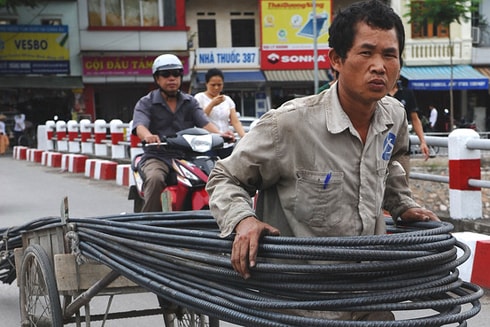Crony relations - a huge obstacle to Vietnam's economy
Slow institutional innovation, commercialization of public institutions, and prioritization of resources for a few crony businesses are development barriers for Vietnam, as pointed out by experts.
Institutional reform, innovation and creativity are the main messages presented at the workshop Vietnam Aspiration 2035: The role of enterprises and the requirement of institutional modernization held on May 30.
 |
| Crony relations - an obstacle on the path of economic innovation in Vietnam? Illustration photo: AP. |
At the workshop, Deputy Director of the Institute of Development Strategy (Ministry of Planning and Investment) - Nguyen Van Vinh said that in the 19th century, Vietnam's economy was equal to and even surpassed that of some countries in the region, but now it has fallen behind and been left far behind by those countries in the region. Mr. Vinh said that the main reason lies in the shortcomings of the system. Therefore, it is necessary to reform immediately before being left further behind.
"There were many countries with similar economies at that time, such as Korea, that developed very strongly. With the current reform process, Vietnam is left far behind compared to many countries in the world."
Mr. Vinh believes that there are three main issues in institutional innovation. Firstly, Vietnam is in the golden population period, at maturity, but if it does not exploit its strengths, the opportunity will pass. Secondly, the driving force of Doi Moi 30 years ago with the solutions of that period has now lost its effectiveness, so it is necessary to introduce new, stronger policies that are in line with the trend of the times. Thirdly, from the 90s to now, the process of economic globalization has brought Vietnam into deep integration and signed many trade agreements, creating many opportunities and challenges.
Ms. Pham Thi Thu Hang - General Secretary of VCCI commented that if determined to make efforts, in 20 years, Vietnam can reach the development level of Korea in 2000. If the current growth rate of 5% continues, by 2035 it will only reach the economic development level of Brazil in 2000.
The Vietnam 2035 Report has pointed out the shortcomings of Vietnam’s economic institutions. The commercialization of public institutions creates room for some officials to abuse their authority to regulate the market, enforce the law, and allocate property rights to benefit themselves and their cronies. The effectiveness of the State is also eroded by favoritism toward state-owned enterprises and enterprises with friendly relationships, leading to non-transparent policy decisions.
Director of the Central Institute for Economic Management (CIEM) Nguyen Dinh Cung said that widespread cronyism has distorted, erred and lacked transparency in the business environment.
Ms. Victoria Kwakwa - Director of the World Bank in Vietnam, acknowledged that the economy has many small and micro enterprises. In the context of deep integration, the fate of these enterprises is very fragile. Therefore, she suggested that Vietnam promote strong institutional reforms and listen to institutional contributions from enterprises.
To achieve the aspirations and goals set out in the Vietnam 2035 Report, experts recommend that Vietnam needs to reform towards applying market principles in economic policy making.
State agencies directly or indirectly involved in economic regulations will not be involved in any business activities to avoid conflicts of interest. The State will change its role from focusing on production and business to building a legal framework and creating a level playing field.
According to VNE
| RELATED NEWS |
|---|


